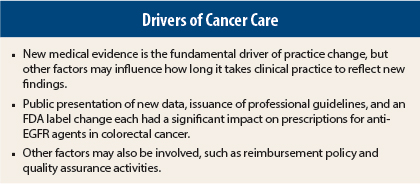Clinical practice changes in response to new medical evidence, but not always immediately or all at once. So what else determines whether and how quickly practice changes in response to evidence, for instance, that a widely used drug is effective only in patients with a certain biomarker?
In a new study,1 researchers looked at the case of one such biomarker, the mutated KRAS gene in colorectal cancer. They identified three events that might have influenced physicians to stop prescribing cetuximab (Erbitux) and panitumumab (Vectibix) for patients whose tumors have a mutation, once conclusive data emerged showing that the targeted drugs were not effective in these patients. The events were public reporting of the data, publication of new guidelines, and a U.S. Food and Drug Administration (FDA) label change. The study showed that all three—especially the FDA action—were followed by significant changes in practice.
The authors, led by Efrat Dotan, MD, Assistant Professor at Fox Chase Cancer Center, looked specifically at whether and how much the use of the two agents, both epidermal growth factor receptor (EGFR) inhibitors, declined after each event. The first was ASCO’s Annual Meeting in June 2008, where the evidence was presented. The following February, ASCO issued a Provisional Clinical Opinion recommending that the drugs be used only in patients with wild-type KRAS, and in August 2009, the FDA changed the drugs’ labels to reflect the new evidence.
Significant Changes
Using a commercial insurance claims database, the authors found that at the time of the ASCO presentation, 59.4% of colorectal cancer patients had received one of the anti-EGFR agents as part of second-line therapy, or beyond. That dropped to 46.2% following the publication of the Provisional Clinical Opinion by ASCO and to 35.2% at the time of the FDA label change. Eight months after the FDA action, only 16.2% of patients received the drugs. The greatest decline occurred after the label change, but the decrease in use was statistically significant at all points.
“These results suggest the attentiveness of the oncologic community to clinical presentations at national meetings and ASCO guidance,” the authors wrote. “It is also evidence that oncologists change their practice promptly in the face of highly publicized data, even years after a drug’s original approval.” ■
Disclosure: Dr. Dotan reported no potential conflicts of interest. For full disclosures of all study authors, visit jop.ascopubs.org.
Reference
1. Dotan E, Li T, Hall MJ, et al: Oncologists’ response to new data regarding the use of epidermal growth factor receptor inhibitors in colorectal cancer. J Oncol Pract. July 22, 2014 (early release online).



